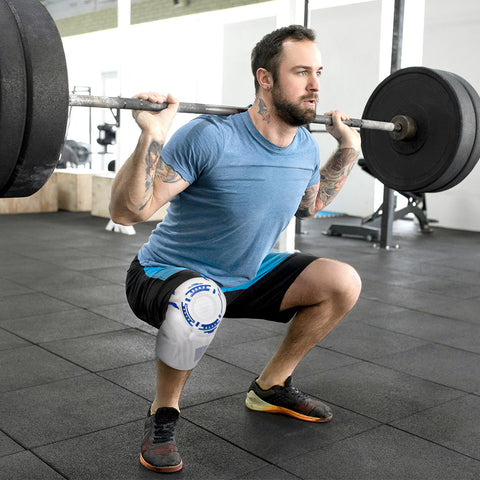How Knee Sleeves Help with Weightlifting?

This article offers valuable insights into the various ways knee sleeves can benefit individuals who lift weights. The essay explores knee sleeves' benefits for support and stability, performance enhancement potential, injury prevention, and aiding in the healing and rehabilitation process. Please let us know more about this question in the Fivali post.
fivalifitness.com
Support and Stability
Lifting weights puts a lot of stress and strain on the knees, which can lead to joint instability, decreased performance, and an increased risk of injury. Knee sleeves provide stability and support to the knee joint, helping lifters maintain proper form and reduce knee overuse during exercise.
Knee sleeves help enhance blood flow and oxygenation to the muscles around the knee, thereby reducing the risk of muscle fatigue and cramping. Additionally, it helps maintain joint warmth, which is essential for preventing injuries and ensuring optimal performance. Furthermore, the ability of knee sleeves to retain warmth can aid in reducing pain and stiffness during and after exercise.
Knee sleeves also serve to promote joint alignment and stability, lowering the risk of injury caused by poor form or excessive movement. They offer a snug fit that lessens the chance of dislocation or subluxation by keeping the patella (kneecap) in place. For individuals recovering from knee injuries or those with pre-existing knee conditions, this can be extremely helpful.
Knee sleeves give lifters more control and stability by minimizing excessive movement during exercises. This can be particularly crucial when performing large lifts, such as deadlifts and squats, as any improper form can increase the risk of injury. Knee sleeves help lifters improve their performance and maintain proper technique while reducing the risk of injury by providing support and stability.
Injury Prevention

A crucial component of any physical exercise, including weightlifting, is preventing injuries. Knee sleeves are a significant factor in reducing the likelihood of knee injury when lifting weights. Knee sleeves can help prevent injuries in the following ways:
- Protection from impact and friction: The hefty loads and repetitive motions of weightlifting workouts can strain the knees. A layer of security and cushioning is provided by knee sleeves, which lessen the chance of joint damage by absorbing some of the stress. They also reduce friction and potential abrasions by forming a barrier between the skin and the apparatus or floor.
- Less strain on tendons and ligaments: The stability and mobility of the knee joint depend on tendons and ligaments. These structures can be strained by overextension or abrupt movements, which can result in sprains or strains. By providing compression, knee sleeves lessen the chance of overstretching and subsequent injury to the ligaments and tendons.
- Preventing hyperextension and hyperflexion: When the knee joint bends beyond its typical range of motion, there is a greater chance of ligament rips or dislocations. Knee sleeves reduce the risk of hyperextension or hyperflexion during weightlifting workouts by supporting the knee joint and limiting its range of motion.
Knee wraps have a major role in minimizing knee injuries during weightlifting exercises by providing protection, stability, and limiting severe motions. Knee sleeves should not, it is crucial to remember, be utilized in place of appropriate technique, a warm-up, and general strength and fitness.
Recovery and Rehabilitation
For individuals who have experienced knee injuries or are undergoing rehabilitation, knee sleeves can be beneficial in their recovery process. Knee sleeves can help with rehabilitation and recovery in the following ways:
- Increased oxygenation and blood flow: The compression provided by knee sleeves enhances oxygenation and blood flow to the surrounding muscles and tissues of the knee. This enhanced blood flow has the potential to decrease inflammation, encourage tissue repair, and quicken the healing process.
- Swelling and inflammation reduction: Knee sleeves can help reduce knee joint swelling and inflammation. Early in the course of an injury, significant fluid buildup is frequent; the compression provided by the sleeves helps to avoid this. Knee sleeves help alleviate pain and discomfort by reducing swelling, making it easier for individuals to perform rehabilitation exercises.
- Support during rehabilitation exercises: During rehabilitation exercises, knee sleeves give the knee joint extra support. They provide a sense of security, enhance proprioception—the awareness of one's joint position—and aid in knee stabilization. Support like this can help people feel more confident and motivate them to complete their workouts with the correct form and technique, which can speed up their recovery.
It is crucial to remember that knee sleeves should only be used in conjunction with a thorough rehabilitation program administered by a medical practitioner. To maximize the rehabilitation process, they should be used in conjunction with suitable workouts, rest, and other recommended therapies, rather than being the sole means of recuperation.
fivalifitness.com
*Disclaimer
The information provided in articles written by Fivali is intended for educational and reference purposes only. The content on this website (www.fivalifitness.com) is not intended to diagnose, treat, cure, or prevent any disease. We do not recommend self-diagnosis or self-treatment based on the information provided in our articles. Always consult a qualified healthcare professional if you have any concerns about your health or well-being.
If you are experiencing any symptoms or discomfort, we strongly recommend seeking medical attention from a qualified healthcare professional. Only a licensed healthcare practitioner can provide an accurate diagnosis and an appropriate treatment plan tailored to your individual needs.
-
Posted in
Brace, Healthy Lifestyle, sports













